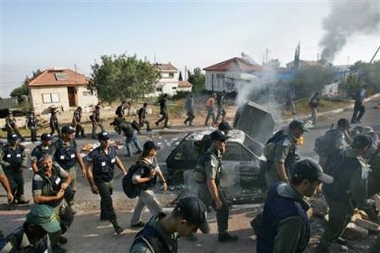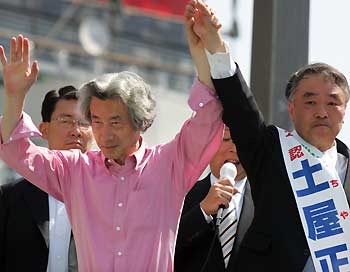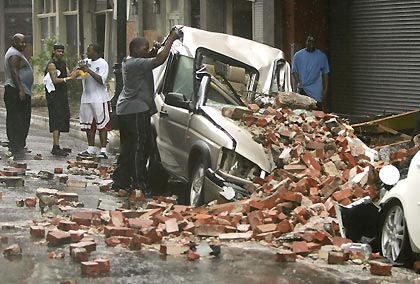|
Troops, extremists face off in West Bank
(AP)
Updated: 2005-08-23 18:24
SANUR, West Bank - Thousands of troops stormed the main
bastions of resistance to the evacuation of two West Bank settlements Tuesday,
clearing out hundreds of extremists opposed to Israel's first dismantling of
West Bank settlements, the Associated Press reported.

Troops pass by a burned car as they enter the
Jewish settlement of Homesh, in the northern West Bank Tuesday Aug. 23,
2005. [AP] |
Security forces had said they expected the evacuation of Sanur and Homesh to
be the most violent phase of the Israeli pullout from the Gaza Strip and four
northern West Bank settlements, but resistance was surprisingly mild.
In Homesh, withdrawal opponents who had barricaded themselves onto the roof
of a religious school locked arms but did not struggle when placed into the
shovel of a bulldozer that lowered them to the ground.
The main synagogue at Sanur was empty less than an hour after forces sawed
open a barricade of iron bars at the synagogue's gates. Troops stormed inside
and brought out dozens of youths.
Troops also broke into a religious school in Sanur and quickly carried out
the 20 black-garbed ultra-Orthodox men holed up inside. A police commander was
surrounded by weeping and chanting worshippers as he made a last appeal that
they leave voluntarily.
Some 10,000 troops were mobilized to clear out the two settlements, where the
resistance was being staged mainly by Israelis from outside the communities.
Security officials initially said some 2,000 extremists were holed up in the
two settlements. On Tuesday, the military offered revised estimates, saying
about 1,600 to 1,700 people, mostly nonresidents, were in Sanur and Homesh
before the evacuation.
Maj. Gen Yair Naveh, the West Bank commander, said rabbis took control of
various groups that might have otherwise offered stiffer resistance.
Forces protected by shields and helmets used circular saws to cut open the
iron doors of an old British fortress in Sanur where most resisters had
barricaded themselves. Troops brought out resisters from the ground floor of the
building as dozens of resisters danced on the rooftop.
In taking the rooftop of the religious school in Homesh, forces protected by
shields used wire cutters to cut the concertina wire resisters had placed around
the roof.
Children of all ages roamed the streets of Homesh and Sanury, enlisted by
their parents in what they view as an apocalyptic battle. In Homesh, a baby
wailed in the arms of a policewoman who carried the child onto a bus whisking
the evacuees away.
Before the operation, police had said militants in both strongholds had
hoarded firebombs and stun grenades. Two army deserters with army-issue weapons
were believed to be inside Homesh.
Residents of the other two West Bank settlements slated for removal, Ganim
and Kadim, have already left on their own. Military bulldozers on Tuesday began
knocking down structures in Ganim, the first demolitions in a West Bank
settlement.
In one of the few instances of Palestinian fire since the evacuations began,
gunmen shot at Israeli troops patrolling an area a few miles from Sanur and
Homesh on Tuesday. One militant was moderately wounded in the ensuing gunbattle,
Israeli and Palestinian security officials said.
The showdown between troops and Jewish pullout opponents in the two West Bank
settlements came just hours after Israel completed its historic evacuation of
Israeli civilians from 21 Jewish settlements in Gaza.
Nine thousand settlers are losing their homes in the pullout. Prime Minister
Ariel Sharon has said the plan improves Israel's security by reducing friction
with the Palestinians, and also solidifies Israel's grip on main West Bank
settlement blocs, where most of the territory's roughly 240,000 settlers live.
The pullout from Gaza and part of the West Bank represents the first time
Israel has abandoned territory the Palestinians claim for their future state. It
cleared the way for Palestinian rule in Gaza for the first time and rekindled
hope for progress toward a peace agreement.
Palestinian leader Mahmoud Abbas called Sharon late Monday, praising him for
a "brave and historic decision." Abbas suggested renewing negotiations, telling
Sharon in their first talk since June, "We are your partner for peace." The two
agreed to meet soon, officials from both sides said.
The past five years of Israeli-Palestinian bloodshed have put the Mideast
peace process into a deep freeze, with Israel continuing to build in West Bank
settlements and Palestinians failing to curb militant attacks on Israelis — both
requirements of the internationally backed "road map" peace plan.
Deputy Prime Minister Ehud Olmert reiterated Tuesday that Palestinians must
do more to rein in militant attacks before negotiations can resume.
"There is not doubt that an effort has been made by (the Palestinians) to
ensure that there will not be terror during the disengagement," Olmert told
Israel Radio on Tuesday, referring to the pullout. "It's a fact that when they
want to (control violence) they are able to do so and therefore they must
continue doing this."
Sharon has insisted that Israel will hold onto the major West Bank settlement
blocs where most Jewish settlers live under any final peace deal.
Israel is giving up four isolated West Bank settlements, which aren't
connected to any large settlement bloc, "to show our seriousness and willingness
to reach a comprehensive agreement" with the Palestinians, said Ranaan Gissin, a
senior Sharon adviser.
Abbas' chief of staff, Rafiq Husseini, said the Palestinians regard the
Israeli pullout from Gaza as "a very important step toward liberation and
freedom and independence." Their next order of business, Husseini said, is to
move on to the building of a democratic nation.
The past years of violence have badly weakened the already corrupt
Palestinian government, whose authority has been challenged by militant
factions. Lawlessness is rampant in the streets of Gaza and the West Bank, and
many Palestinians live in poverty.
The resisters in Sanur and Homesh consider the pullout a dangerous precedent
that threatens all Jewish settlement in the West Bank, which the devout see as
their God-given right.
Subhi Alawneh, a 58-year-old farmer from the nearby Palestinian village of
Jaba, said Tuesday "is a day of celebration" for the more than 40,000
Palestinians who live near Sanur. In another village, residents watched the
evacuations with binoculars and handed out sweets.
"We were afraid of them all the time," Alawneh said,
referring to the settlers. "After they are removed we will distribute sweets and
show happiness, we will go out into the streets to celebrate."
|
 | | | Japanese PM launches general election campaign | | |  | | | Katrina slams US Gulf Coast, oil rigs adrift | | |  | | | Japan's 6 parties square off in TV debate | | |
|
| |
 |
|
 |
|
|
Today's
Top News |
|
|
|
Top World
News |
 |
|
 |
|
|
|
|
|
|


